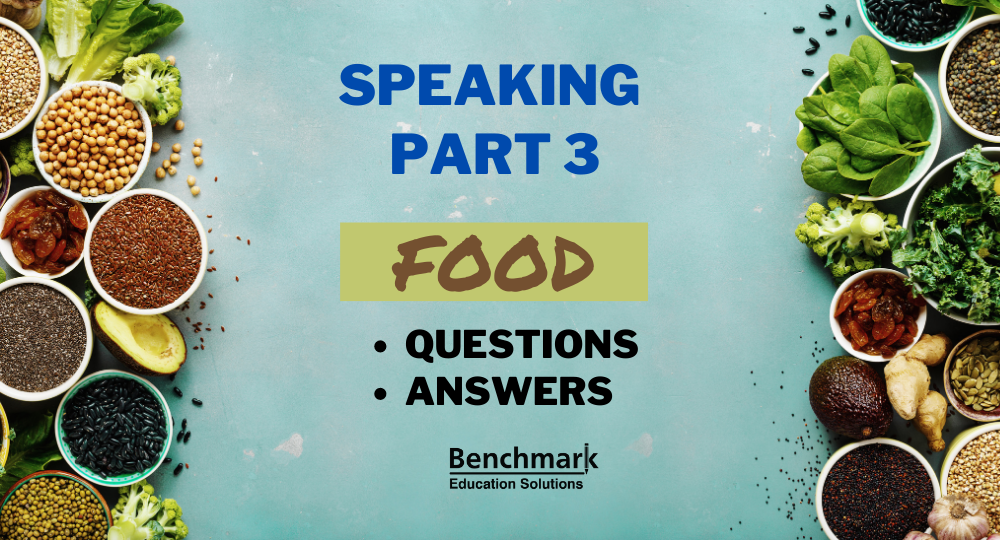Food IELTS IELTS Speaking Part 3 Cue Card Questions with Answers
- 0 Comments

Food IELTS is a follow-up speaking topic that often comes up in the IELTS speaking part 3. Below you will find a list of some exam questions and answers that you could encounter during part 3 of the IELTS Speaking test.
The questions below are based on the real IELTS speaking exam. They serve as a great IELTS Speaking part 3 prediction questions to help you prepare better before your test.
Food Speaking Part 3 – Discussion 1
- Why do people spend a lot on special meals?People don’t mind splurging on special meals because they want it to be a memorable affair. They are not really looking at costs but on making memories to last a lifetime. Also, it’s not everyday that we eat delicious and expensive meals so it makes sense to save up for a special occasion.
- On what occasions do people have special meals?Hmm, in my country, India, people tend to eat well during important festivals such as Diwali because it signifies the victory of good over evil. Birthdays, anniversaries, graduation parties, farewell days in school and college, are some other important days. Oh, and how can I forget the great Indian weddings! Your tastebuds will explode with the sheer variety on offer here.
- What are the benefits of having special meals on particular days?Like I said earlier, eating special meals makes the occasion more memorable. American friends living in India often invite us over for Thanksgiving which falls sometime in November. I look forward to digging into the succulent turkey stuffed with mashed potatoes and peas that my friend’s mother prepares painstakingly. I’ll always associate turkey with Thanksgiving now!
- How are meals from your country different from other countries’?Meals in my country tend to be spicier and oilier, and we use a lot of ginger, garlic, and onions. Also, we tend to eat fresh food and don’t like pre-cooked, frozen meals. But this is changing slowly in big cities where young urban professionals just don’t have the time to cook. Another difference is that Indians like a lot of variety in their meals whereas abroad, people seem content with one main dish
Food Vocabulary Speaking Part 3 – Discussion 1
- To splurge – to spend money freely
- Succulent – tender, juicy and tasty
Other IELTS Speaking Part 3 Topics
Here are other common topics that you could come across during the IELTS Speaking Part 3 test.
Discussion 2
- Do most people prefer to go to restaurants or cafes? Why?Here in Nepal, most people don’t really know the difference between a restaurant and a cafe. They use both words interchangeably. I think older people end up going to restaurants for lunch or dinner as they can afford it whereas youngsters find that cafes fit their budget best.
- Why do some people enjoy going out to eat?It’s probably because they are more social in nature, and like meeting friends at restaurants. They are also not overly finicky about health and hygiene, and know how to enjoy life to the fullest. Foodies are the most fun people around in my opinion.
- Why do some people feel nervous in a crowded city and others don’t?Big cities can be intimidating because of their sheer size and pace. Also most city people are too busy to stop and take notice of someone who is struggling to find their way around. It’s a dog-eat-dog world and each one is fighting for their own survival. Weak people end up feeling afraid while the thick-skinned take it all in their stride.
Vocabulary for Discussion 2
- Thick-skinned – insensitive to criticism or insults
- Interchangeably – in a way that can be exchanged
- Finicky – (of a person) fussy about their needs or requirements
- Dog-eat-dog world – In a dog-eat-dog world, people will do whatever it takes to be successful, even if that means harming others
- To take things in one’s stride – to deal with (something difficult or upsetting) in a calm way
Discussion 3
- What kind of food is popular in your country?In Spain the most popular foods are paella and tapas. Most families will have paella once a week and will make a traditional version with chicken and rabbit but there are lots of other rice dishes. Tapas are small plates that you can share with friends and are a really good way to eat in the evening.
- Do older and younger people eat different things?The food culture in Spain is changing, especially in the big cities. Young people are eating more international cuisines such as Japanese and Indian foods and more international restaurants are popping up everywhere. The older generation tend to be a little more traditional are continue to prefer traditional rice dishes or meat and potatoes.
- Do you think young people will change what they eat in the future?I think the new generations will continue to incorporate international flavours into their everyday meals because of globalisation and travel. Also, there is a big push towards veganism at the moment so I think people will eat less meat in the future due to the cost and effect on the planet.
- Should children be taught about healthy food habits at school?Yes, I think it is important to introduce healthy food to children from the outset. Schools should encourage children to identify fruits and vegetables and take part in fun activities about growing or preparing food. Parents also have a responsibility to continue the learning at home and help children make good lifestyle choices.
- Can social media influence what people eat?I believe social media affects lots of things including what people eat. For example, lots of adverts pop up advertising junk food and healthy options. People are influenced by celebrity endorsers and influencers looking good and eating these foods. There are pros and cons, you might be encouraged to buy something healthy or unhealthy.
Vocabulary for Discussion 3
- popping up – appear suddenly
- a big push towards – try to change something
- from the outset – from the beginning
- junk food – unhealthy food
Discussion 4
- Does your country have famous regional products?The region I am from is famous for tapas, a small food snack that you are given with a drink. This can consist of meat, cheese, fish or olives and you get a different plate each time you order a drink. Some other areas of Spain also offer this but it originated in Andalusia. Valencia is famous for the paella, a rice dish with chicken and rabbit.
- Do people care about eating local food?In my country, people are very passionate about this and people will eat seasonal fruit and vegetables that are grown in the area. Having said that, the culture is changing and people are buying more and more supermarket products because they are often cheaper and it is more convenient. This is a pity for the farmers as they cannot compete with these businesses.
- How does your country export and import products?As I said, I think Spain mainly exports food products to other countries but they also export a lot of cars. Most electronic devices and gadgets are imported from China and other Asian countries. A lot of the manufacturing industries are dying out as people are not continuing to pursue them as a career.
- Is there a large pharmaceutical industry in your country?Yes there is. You will find a pharmacy in every neighbourhood in towns and cities; it is big business. The pharmaceutical companies show lots of adverts on TV and you can buy a lot of medicines over the counter without seeing a doctor. Unlike in other countries, you can´t buy these products in supermarkets so the pharmacies are not competitively priced.
Vocabulary for Discussion 4
- a pity – a sad situation
- dying out – disappearing
- over the counter – buy medicine in a pharmacy with a doctor giving permission


